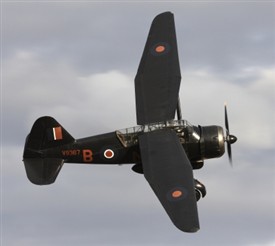Then Came the War
Shrapnel still hot and smelling of cordite
By Ted Blowers

A Lysander
Bernie Condon/Free digital photos(see link at foot of page)
Then came the war - this brought a hive of activity of men uprooting their beloved gardens to put in Anderson shelters. Blackout curtains had to be made and no light was allowed to escape from the house. There were fire drills, gas alerts by the ARP. In the very early days it didn't seem to make any difference and I remember sitting on the steps of our house watching the barrage balloons and Lysanders which droned overhead like gigantic dragonflies. Changes came to everybody particularly the parents. The young men that we had seen playing cricket and football for the better teams that we admired and many fathers disappeared into the forces at an alarming rate. Soon all the iron railings around the parks and any spare metal also disappeared to be used in munitions. Women were asked to give up their aluminium pots and pans and as the war progressed the women replaced the men in the factories and on the land.
At first nothing changed very much for the kids and the games went on as usual. Cowboys and Indians or anything we had seen at the local cinema, sometimes became English and Germans. Shelters of every type and description seemed to appear from nowhere. Most people had one in their back garden called an Anderson shelter. There were many brick shelters built at strategic locations and everybody had to have blackout curtains. There were no street lights and buses and vehicle lights had to be sheltered so they couldn't be seen from the air. It was a total blackout. To enforce it people were appointed as air raid wardens and everybody had to carry gas mask and identity papers. Everything was rationed and beginning to get difficult to obtain. It was a very trying time for mothers because they didn't want to let you out of their sight and as a child this is a great infringement on your liberty. However, as time passed people got more used to the fact that life must go on. When a siren, which became known as moaning mini ,would go, even us kids would run home as fast as possible or run to the nearest shelter. But we resumed life more or less as it was before.
Then the blitz started and we were confined to our homes or shelters night after night with tremendous raids and bombs dropping everywhere and houses burning. it must have been terrible for the parents. In the mornings after a raid the kids would emerge from their shelters or homes and race around the streets picking up shrapnel, which was still hot and smelling strongly of cordite. It was twisted into all sorts of amazing shapes being the debris of course of shells and bombs. Some of the shapes seemed to us quite beautiful and many boys made collections of them, tying them to bits of cardboard or old bits of wood that they could find. The collection and swapping of these pieces became quite a major thing between the boys during the war. Another was collecting and swapping of military badges. If we saw any soldier, sailor or airman, we would always ask “Have you any badges?” As our collections grew we would place them on belts or on pieces of plywood. Many wives and sweethearts would also wear badges of their husbands or boyfriends on their handbags or coats to show their allegiance and support. With the blitz the war had started for us in earnest. Although things were very hard, the camaraderie of the people and the humour began to weld us together as a nation. We all needed each other. Our doors were never locked and neighbours wandered in and out at will! “Have you got a cup of sugar?”, or “Here's a bit of something we can't use, maybe you can use it.” All those poor women with frayed nerves worrying about their loved ones and having to cope with shortages and kids that didn't understand the fear or the necessity for packing a gas mask everywhere you went. What heroes they really were, with the whole community acting as a resident psychiatrist to those that needed it.